Nonviolence, Pragmatism & the Fantasy of Revenge
The wisdom or efficacy of nonviolence is determined by the situations in which one finds oneself and the objectives one is seeking to achieve. If you are trying to stop a heavily militarized monster like Hitler, it's clear that violence is going to be needed. However, if you are trying to effect social or political change from a position of inferior power, nonviolent action offers the best chance for lasting positive change.
This is why Martin Luther King Jr. and the thousands of other heroes of the American Civil Rights Movement were able to achieve what they did. If they had chosen violence they would have at once ceded any moral superiority, and the use of violence by the oppressor would have become justified, placing the Movement on a direct path to defeat given the huge asymmetry of physical and institutional power. One of the most indelible images from the Movement was created, in 1963, when peaceful school-aged marchers in Birmingham, Alabama were blasted with high intensity fire houses and set upon by dogs. When the footage aired, the balance of moral sentiment shifted irreversibly toward the Movement and its objectives.
Further, the Movement was not seeking revenge. They were seeking a transformed society in which the sickness of racism might begin to be vanquished from the hearts and minds of those stuck in an old view of the world. They sought a society in which equal rights might be extended, not just to Black Americans, but to all the dispossessed and excluded. Third, they rejected revenge because they understood that, as King put it, humanity is like a family that has inherited a large house that it must somehow find a way to live in together.
Revenge fantasies make for compelling, satisfying stories. This is Quentin Tarantino's bread and butter. But in the end his movies are indeed just that: fantasies and nothing more. Getting violent revenge on particular Nazis or slave owners would have done nothing to change the larger systems or patterns of injustice that keep us from our fullest potential.

Comments
Post a Comment